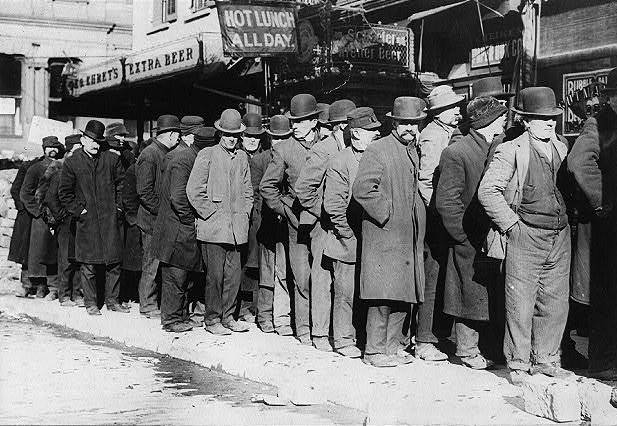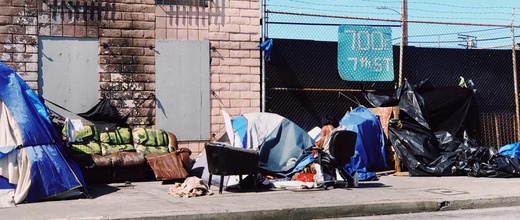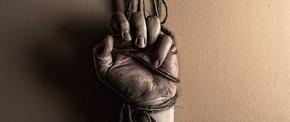The views expressed in our content reflect individual perspectives and do not represent the authoritative views of the Baha'i Faith.
If you’ve ever visited Skid Row in downtown Los Angeles, or the various skid rows in urban areas just about anywhere, you’ve probably figured out how they got their name.
Generally, skid rows become the destinations of people “on the skids,” who seek out those marginalized urban districts in every city where the poor and the homeless congregate and try to eke out an existence there. Known for cheap housing, dilapidated buildings and social service agencies who try to help poor and homeless people, most large cities have an impoverished district some call Skid Row.
“Why would the leader of a global religion from the East want to visit the poorest area and the poorest people in New York City?”
Usually you won’t find Skid Row on the map or in the tourist guidebooks and websites. Few visitors see Skid Row as a pleasant destination. That’s why, when Abdu’l-Baha travelled to the United States in 1912, many people expressed surprise when he asked to go to the Bowery.
Why would the leader of a global religion from the East want to visit the poorest area and the poorest people in New York City?
A hundred years ago New York City’s skid row neighborhood, known as the Bowery, contained a large population of homeless people, vagrants, alcoholics, drug addicts, prostitutes and poor immigrants. Because of its large population of poor people, the very first YMCA started in the Bowery in 1873, and a well-known homeless shelter for men called the Bowery Mission opened in 1880. The Bowery has largely gentrified today, although the Bowery Mission still serves poor and homeless people there.
Abdu’l-Baha, also known as the Master – the son of Baha’u’llah and the leader of the Baha’i Faith after his father’s passing – met with many of the leading figures in America during his trip to the U.S. and Canada, including the industrialist and philanthropist Andrew Carnegie, the inventor Alexander Graham Bell, the labor leader Samuel Gompers, and the renowned explorer Robert Peary.

But on the night of April 19, 1912, greeting the poor and homeless men at the Bowery Mission exceeded the importance of all those meetings.
“I am in love with the poor,” Abdu’l-Baha told Juliet Thompson, an American Baha’i artist who lived in New York. She accompanied him to the Bowery Mission that night, heard his moving talk, and then watched as he shook hands, one by one, with the hundreds of poor men there. To each man he gave at least one silver coin (today’s equivalent of six dollars), enough for a bed for the night and two meals at the Mission. This symbolic gift, the Master said in his talk at the Bowery Mission that evening, represented his love and care for these indigent men:
Tonight I am very happy, for I have come here to meet my friends. I consider you my relatives, my companions; and I am your comrade.
You must be thankful to God that you are poor, for Jesus Christ has said, “Blessed are the poor.” He never said, “Blessed are the rich.” He said, too, that the Kingdom is for the poor and that it is easier for a camel to enter a needle’s eye than for a rich man to enter God’s Kingdom. Therefore, you must be thankful to God that although in this world you are indigent, yet the treasures of God are within your reach; and although in the material realm you are poor, yet in the Kingdom of God you are precious. Jesus Himself was poor. He did not belong to the rich. He passed His time in the desert, traveling among the poor, and lived upon the herbs of the field. He had no place to lay His head, no home. He was exposed in the open to heat, cold and frost – to inclement weather of all kinds – yet He chose this rather than riches. – Abdu’l-Baha, The Promulgation of Universal Peace
In her diary Juliet Thompson recorded what happened after Abdu’l-Baha’s moving speech:
As the men filed toward Him, the Master held out His hand to the first, grasped the man’s hand and left something in it. Perhaps five or six quarters, for John Good told me afterward that the completely destitute ones received the most. The man glanced up surprised. His eyes met the Master’s look, which seemed to be plunging deep into his heart with fathomless understanding. He, this poor derelict, must have known very little of even human love or understanding; and now, too suddenly, he stood face to face with Divine Love. He looked startled, incredulous – as though he couldn’t believe what he saw; then his eyes strained toward the Master, something new burning in them, and the Master’s eyes answered with a great flash, revealing a more mysterious, a profounder love. A drowning man rescued, or – taken up into heaven? I saw this repeated scores of times. – The Diary of Juliet Thompson, pp. 259-260.
In his talk to those homeless men in the Bowery, Abdu’l-Baha told them the story of his father Baha’u’llah, who chose a spiritual life rather than a material one:
Our hope is in the mercy of God, and there is no doubt that the divine compassion is bestowed upon the poor. Jesus Christ said so; Baha’u’llah said so. While Baha’u’llah was in Baghdad, still in possession of great wealth, He left all He had and went alone from the city, living two years among the poor. They were His comrades. He ate with them, slept with them and gloried in being one of them. He chose for one of His names the title of The Poor One and often in His Writings refers to Himself as Darvish, which in Persian means poor; and of this title He was very proud. He admonished all that we must be the servants of the poor, helpers of the poor, remember the sorrows of the poor, associate with them; for thereby we may inherit the Kingdom of heaven. – Abdu’l-Baha, The Promulgation of Universal Peace
After his visit to the Bowery, someone asked Abdu’l-Baha later than night “if charity were advisable:”
He laughed and, still laughing, said: “Assuredly, give to the poor. If you give them only words, when they put their hands into their pockets after you have gone, they will find themselves none the richer for you!” – The Diary of Juliet Thompson, p. 266.

















Comments
Sign in or create an account
Continue with Facebookor